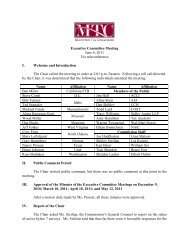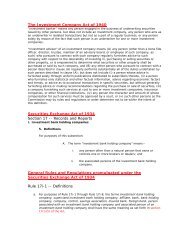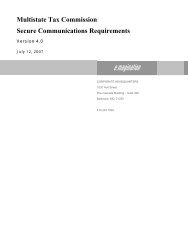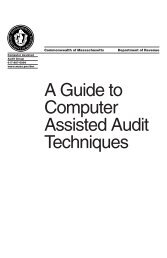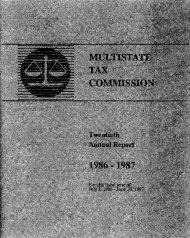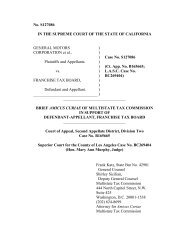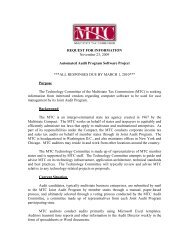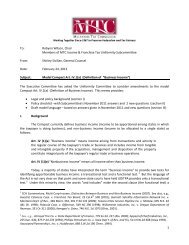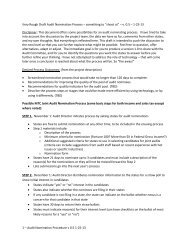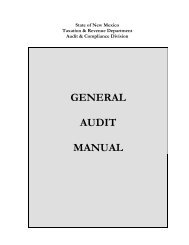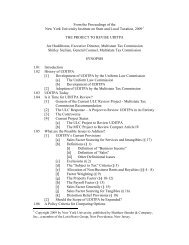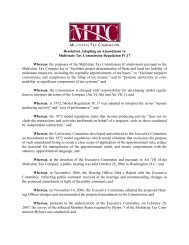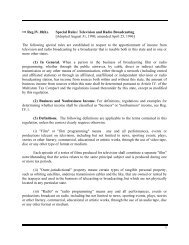Tax Class Action and False Claims Act Presentation - Multistate Tax ...
Tax Class Action and False Claims Act Presentation - Multistate Tax ...
Tax Class Action and False Claims Act Presentation - Multistate Tax ...
Create successful ePaper yourself
Turn your PDF publications into a flip-book with our unique Google optimized e-Paper software.
Qui Tam <strong><strong>Act</strong>ion</strong>s <strong>and</strong> <strong>False</strong> <strong>Claims</strong> <strong>Act</strong>s<br />
• In common law, a writ of qui tam is a writ<br />
whereby a private individual who assists a<br />
prosecution can receive all or part of any<br />
penalty imposed. Its name is an abbreviation<br />
of the Latin phrase qui tam pro domino rege<br />
quam pro se ipso in hac parte sequitur,<br />
meaning "[he] who sues in this matter for the<br />
king as [well as] for himself."
The federal <strong>False</strong> <strong>Claims</strong> <strong>Act</strong> (31 U.S.C. §§ 3729–373)<br />
• Imposes liability (typically on federal contractors) who<br />
defraud governmental programs. The law includes a "qui<br />
tam" provision that allows private parties to file actions on<br />
behalf of the government.<br />
• Persons filing under the <strong>Act</strong> often receive a portion (usually<br />
about 15–25 percent) of any recovered damages.<br />
• <strong>Claims</strong> under the law have typically involved health care,<br />
military, or other government spending programs, <strong>and</strong><br />
dominate the list of largest pharmaceutical settlements.<br />
• The government has recovered nearly $22 billion under the<br />
<strong>False</strong> <strong>Claims</strong> <strong>Act</strong> between 1987 <strong>and</strong> 2008.
State <strong>False</strong> <strong>Claims</strong> <strong>Act</strong>s<br />
• Twenty-nine states <strong>and</strong> the District of Columbia<br />
have also enacted false-claims statutes to protect<br />
their publicly funded programs from fraud by<br />
including qui tam provisions.<br />
• Twenty of these state <strong>False</strong> <strong>Claims</strong> <strong>Act</strong> statutes<br />
provide similar protections to those of the federal<br />
law, while ten states have laws which limit<br />
recovery to claims of fraud related to the<br />
Medicaid program.
States With <strong>False</strong> <strong>Claims</strong> <strong>Act</strong>s<br />
* = Medicaid only. ♦ = statute provides remedies for Medicaid<br />
fraud at least as stringent as under the federal statute.<br />
• California ♦<br />
• Colorado *<br />
• Connecticut *<br />
• Delaware<br />
• District of Columbia<br />
• Florida<br />
• Georgia ♦<br />
• Hawaii ♦<br />
• Illinois ♦
• Indiana ♦<br />
• Iowa *<br />
• Louisiana *<br />
• Maryl<strong>and</strong> *<br />
• Massachusetts ♦<br />
• Michigan * ♦<br />
• Minnesota<br />
• Montana<br />
• Nevada ♦
• New Hampshire<br />
• New Jersey<br />
• New Mexico<br />
• New York ♦<br />
• North Carolina<br />
• Oklahoma<br />
• Rhode Isl<strong>and</strong> ♦<br />
• Tennessee ♦<br />
• Texas * ♦<br />
• Virginia ♦<br />
• Washington *<br />
• Wisconsin * ♦
New York Says Yes to <strong>False</strong> <strong>Claims</strong> <strong>Act</strong><br />
Qui Tam <strong>Tax</strong> Cases<br />
http://www.corporatecrimereporter.com/news/<br />
200/krakowerquitamtax12032012/
State ex. rel. Beeler, Schad & Diamond, P.C. v.<br />
Ritz Camera Ctr., Inc., 878 N.E.2d 1152 (Ill. App. Ct. 2007).<br />
• RITZ CAMERA CENTERS, INC., <strong>and</strong> Ritz Interactive, Inc., <strong>and</strong> Wolf Camera, Inc.<br />
dELiA*s Corp., NBTY, Inc., <strong>and</strong> Vitamin World, Inc., <strong>and</strong> Vitamin World Online, Inc.,<br />
Anthropologie, Inc., Anthropologie Direct, LLC, <strong>and</strong> Urban Outfitters Direct, LLC,<br />
MTS Incorporated, <strong>and</strong> Tower Direct LLC, Pacific Sunware of California, Inc., <strong>and</strong><br />
Pacsun.Com, PetsMart, Inc., PetsMart.Com, <strong>and</strong> PetsMart direct, Bassnet, Inc.,<br />
G.H. Bass & Co., Izod Corporation, Izod.Com, Inc., <strong>and</strong> Phillips Van–Heusen<br />
Corporation, Retail Br<strong>and</strong> Alliance, Inc., d/b/a Casual Corner Group, Presidio Retail,<br />
Inc., d/b/a Armani Exchange, Hallmark Cards, Inc., The Pfaltzgraff Company, Hot<br />
Topic, Inc., Bass Pro, Inc., Bass Pro Outdoor World, L.L.C., Bass Pro Outdoors<br />
Online, L.L.C., <strong>and</strong> Three Johns Company, a/k/a Bass Pro Shops, Inc., New Balance<br />
Athletic Shoe, Inc., New Balance Web Express, Books–A–Million, Inc.,<br />
Booksamillion.Com, Inc., 1–800–Flowers.Com, Inc., Maidenform, Inc.,<br />
Tupperware.Com, Inc., Amazon.Com, Inc., Borders Group, Inc., Borders Online,<br />
Inc., Toysrus, Inc., <strong>and</strong> Toysrus.Com, EB Catalog Co., Inc., EB World.Com, Inc., <strong>and</strong><br />
Electronics Boutique Holding Corp., Spencer Gifts Online, Inc., Universal Studios,<br />
Inc., <strong>and</strong> Universal Studios On–Line, Inc., Stuart Weitaman, Inc., <strong>and</strong> Gateway, Inc.,<br />
f/k/a Gateway 2000, Defendants–Appellants.
State ex. rel. Beeler, Schad & Diamond, P.C. v.<br />
Ritz Camera Ctr., Inc., 878 N.E.2d 1152 (Ill. App. Ct. 2007).<br />
• The Appellate Court, on certified questions, held that:<br />
• a remote retailer cannot make a “knowingly” false record or statement sufficient to create<br />
liability under the <strong>Act</strong> if the retailer discloses that no use tax is due or collected based on the<br />
taxpayer's reasonable interpretation of the law;<br />
• to state a claim under the <strong>Act</strong>, the alleged violation must be based on a false statement or<br />
document;<br />
• documents memorializing a purchase that discloses that no use tax is being collected cannot<br />
be considered false sufficient to create liability under the <strong>Act</strong>;<br />
• it is not necessary for a false record or statement to be submitted to or directly relied upon<br />
by the state to violate the <strong>Act</strong>;<br />
• <strong>Act</strong> applies to alleged tax liabilities under the Use <strong>Tax</strong> <strong>Act</strong> when fraudulent records <strong>and</strong><br />
statements exist; <strong>and</strong><br />
• <strong>Act</strong> does not violate the Attorney General Clause or the Executive Compensation Clause of<br />
the State Constitution.
HB0074<br />
98 th General Assembly<br />
State of Illinois<br />
2013 <strong>and</strong> 2014<br />
• Court of <strong>Claims</strong> granted jurisdiction of all appeals of determinations by the<br />
Department of Revenue regarding awards under Section 4.5 of the Illinois <strong>False</strong><br />
<strong>Claims</strong> <strong>Act</strong>. Sec. 5, adding new Section 8(j) of the Court of <strong>Claims</strong> <strong>Act</strong>.<br />
• All courts divested of civil actions that relate to or involve a false claim regarding a<br />
tax administered by the Department of Revenue. A list of taxes follows. Section<br />
10, amending Section 4(e) of the Illinois <strong>False</strong> <strong>Claims</strong> <strong>Act</strong> to add a new Section 4(e)<br />
(5).<br />
• Department of Revenue given sole authority to bring administrative action<br />
resulting from information provided by any person alleging a false claim under the<br />
<strong>False</strong> Claim <strong>Act</strong>. New Section 4.5 of the <strong>False</strong> <strong>Claims</strong> <strong>Act</strong>. Department of Revenue<br />
is to notify the AG within 60 days of any such false claim act report. Following its<br />
investigation of a false claim, the Department is to make a recommendation to the<br />
AG as to whether the AG should bring an action under the <strong>False</strong> <strong>Claims</strong> <strong>Act</strong> for all<br />
applicable tax <strong>and</strong> interest the Department determines to be due. The AG has the<br />
ultimate authority to accept or reject the Department’s recommendation. AG<br />
retains discretion to file false claim action in the absence of a departmental<br />
recommendation. Department of Revenue retains discretion to proceed by way of<br />
audit instead of false claim. Department false claim administrative action is stayed<br />
if AG files false claim action. However, any audit conducted instead of false claim<br />
administrative action is not stayed even if AG files false claim action.
• If AG proceeds with a judicial action based on information provided by<br />
a person, the person shall receive an award equal to at least 15% but<br />
not more than 30% of any recovery. If the Revenue Department<br />
proceeds by administrative action, the award shall be at least 10% but<br />
not more than 15%. No recovery for expenses, attorney’s fees, or<br />
costs. In addition, if the disclosure of specific allegations resulting<br />
from a judicial or administrative hearing, a government report,<br />
hearing, audit or investigation, or from the news media is determined<br />
by the Department to have been the principal source of information<br />
leading to a recovery, a person making such disclosure (other than the<br />
person filing a false claim), may receive an award determined by the<br />
Department, <strong>and</strong> not in excess of 10% of the recovery.<br />
• Reduction in award for “false false claims” if the Department<br />
determines that a false claim was filed by a person who planned the<br />
actions that led to the false claim. No award if such person is<br />
convicted of criminal conduct arising from the actions that led to the<br />
false claim.
Overpayment <strong>Class</strong> <strong><strong>Act</strong>ion</strong>s<br />
<strong>Tax</strong> Collection <strong>Class</strong> <strong><strong>Act</strong>ion</strong> & <strong>False</strong> <strong>Claims</strong> <strong>Act</strong> Project<br />
Draft Issues List<br />
February 22, 2013<br />
1. To what extent do state laws currently allow class actions against sellers for<br />
overcollection of tax To what extent are state <strong>False</strong> <strong>Claims</strong> <strong>Act</strong>s or common law<br />
equivalents being used in private litigation alleging undercollection of tax<br />
2. Should states that impose tax on the buyer limit buyers’ class actions against sellers<br />
for overcollection of tax <strong>and</strong>/or <strong>False</strong> <strong>Claims</strong> <strong>Act</strong> litigation for undercollection of tax<br />
a. Have such actions altered the economics of tax collection, such that sellers may<br />
believe themselves at significant risk of litigation if they collect less than/more than<br />
the proper amount of tax<br />
b. What issues are implicated by having such actions heard by general civil courts<br />
rather than following state procedures for resolving tax disputes For example, the<br />
taxing authority is often not joined as a party in these actions <strong>and</strong> may not have a right<br />
to intervene.
c. If a seller is in fact routinely overcollecting, do state tax procedures other than class<br />
actions adequately address that problem Even if an individual consumer is aware of<br />
the issue, the amount of overcollected tax may well be too small to justify filing <strong>and</strong><br />
documenting a refund claim. In the absence of a refund claim, can revenue<br />
departments effectively monitor routine overcollections in a cost-efficient manner<br />
d. State law requires sellers to collect tax on behalf of the state. Does the state<br />
therefore have an obligation to minimize seller costs of compliance by providing<br />
mechanisms to reduce consumer lawsuits against sellers for under- or overcollection<br />
of tax<br />
f. What additional costs are the states likely to incur if they establish administrative<br />
mechanisms to deal with systemic issues of overcollection of tax In other words, if<br />
class actions were eliminated, would the states need to put something else in their<br />
place to address the possibility of systemic overcollection, <strong>and</strong> if so, what would be<br />
the associated costs<br />
3. If alternative procedures for individual consumer refund claims should be<br />
established, what should they be
Additional <strong>Class</strong> <strong><strong>Act</strong>ion</strong> Issues Identified in Staff Memo<br />
to Sales <strong>and</strong> Use <strong>Tax</strong> Uniformity Subcommittee<br />
(November 21, 2012)<br />
• In considering whether to endorse the ABA Model Transactional <strong>Tax</strong> Overpayment<br />
<strong>Act</strong>, there are a number of issues the Commission might first explore. Those issues<br />
include, at a minimum, the following:<br />
• Are current state laws adequate to address the issue of class action lawsuits<br />
against sellers that seek to recover damages for alleged overpayment of<br />
transaction tax<br />
• If not, why not What are the shortcomings in existing law that need to be<br />
addressed<br />
• Is the Model <strong>Act</strong> an appropriate <strong>and</strong> effective response to the problem<br />
• If the Model <strong>Act</strong> were to be adopted, what if any implications would there be for<br />
current state sales <strong>and</strong> use tax refund procedures For example, the Model <strong>Act</strong><br />
allows purchasers to file refund claims alternatively with the seller or with the<br />
taxing jurisdiction. While the Model <strong>Act</strong> does not allow for duplicate refund claims,<br />
is it clear under the Model <strong>Act</strong> that there would be mechanisms in place to assure<br />
that such duplicate claims are not in fact filed Otherwise, the taxing jurisdiction<br />
would at the least incur unnecessary costs in processing a duplicate claim <strong>and</strong> at<br />
worst, might pay a duplicate claim that the seller has already paid.<br />
• Should the Commission encourage the adoption of the Model <strong>Act</strong><br />
• If so, what form(s) should the Commission’s encouragement take A resolution<br />
Written testimony Oral testimony
Additional <strong>False</strong> <strong>Claims</strong> <strong>Act</strong> Issues Identified in Staff Memo to<br />
Sales <strong>and</strong> Use <strong>Tax</strong> Uniformity Subcommittee (November 21,<br />
2012)<br />
• Is there a problem with FCA lawsuits in relation to state <strong>and</strong> local taxation of such<br />
magnitude that legislation is required<br />
• Is the Commission the appropriate body to draft model qui tam legislation for tax<br />
issues<br />
• What is the appropriate scope for any such legislation For example, should a<br />
carve out from state FCAs encompass all cases that relate to state taxation Or<br />
only cases where liability for tax is unclear Is such a distinction – clear liability vs.<br />
uncertain liability – administrable<br />
• Alternatively, should FCA claims related to state taxation be allowed only in cases<br />
where it is asserted that the defendants have acted knowingly or committed<br />
malfeasance in avoiding state taxes<br />
• Should the carve out include cases where the state has elected to pursue the FCA<br />
in lieu of the private attorney general Or should it be limited to FCAs that are in<br />
fact prosecuted by the private attorney general<br />
• Should the carve out encompass all state taxes Or should FCA claims be allowed<br />
in cases of failure to collect transaction tax, at least under some circumstances



